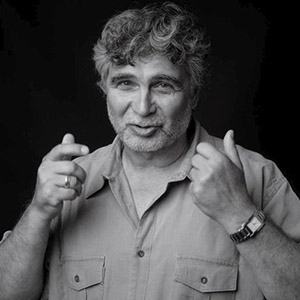Maurice Possley
T. Anthony Pollner Distinguished Professor, Fall 2003
 ABOUT: Maurice Possley, a former investigative reporter for the Chicago Tribune and Pulitzer Prize-winning journalist, taught a course on investigative reporting and criminal justice during the fall of 2003. His Pollner lecture examined how DNA evidence has helped expose flaws in the U.S. justice system. In the waning days of his tenure at UM, Possley wrote a colleague: "I'm battling little lumps in my throat at various moments...about leaving." For more on Maurice, check out his website.
ABOUT: Maurice Possley, a former investigative reporter for the Chicago Tribune and Pulitzer Prize-winning journalist, taught a course on investigative reporting and criminal justice during the fall of 2003. His Pollner lecture examined how DNA evidence has helped expose flaws in the U.S. justice system. In the waning days of his tenure at UM, Possley wrote a colleague: "I'm battling little lumps in my throat at various moments...about leaving." For more on Maurice, check out his website.
REFLECTIONS
"My Pollner Experience" by Maurice Possley
Being the skeptics that journalists are, my co-workers at the Chicago Tribune, upon hearing that I was leaving for a semester as the T. Anthony Pollner professor at the University of Montana and knowing my fondness for fly fishing, were quick to brand it a boondoggle.
I must admit that in my letter of application for the position, the second sentence said, "I would be less than honest if I didn't say that I like to fly fish."
And I have to reveal that was written in part because I had visited the school's Web site and learned that Carol Van Valkenburg, the print department chair, shared that avocation.
And in the interest of full disclosure, I would be less than honest if I didn't disclose that within the first week of my arrival I caught an 18-inch rainbow trout in the Clark Fork River - the biggest trout I had ever fooled in my life - and would catch many more over the next several weeks.
But I would also be less than honest if I didn't say that my experience at the University of Montana has been one of the most rewarding times of my more than 30 years as a journalist.
Prior to my arrival, I had scanned the online biographies of the faculty and staff in the School of Journalism, but those thumbnail sketches will never do justice to reality. And it is no surprise to me, after meeting the professors here and seeing them in action, that the University of Montana turns out one quality journalist after another in all fields: print, broadcast and photography.
Not only was I most impressed with their abilities as molders of minds, but also with the wealth of experience they bring from their work as journalists prior to entering academia. This is not a place where burned out writers, photographers, producers, editors and broadcasters have come to take it easy, put their feet up and turn on the automatic pilot until retirement beckons.
These are people who have channeled their wealth of experience into a productive and thought-provoking environment for students and whose networking abilities help students obtain valuable internships. The students go on to get good jobs on the basis of their abilities and knowledge.
The enthusiasm and drive of the faculty - the list is all-inclusive, so I won't mention names, but advise the curious to head straight to the faculty Web page - are inspirational and, most importantly, contagious. The students catch it. The visiting professor caught it. And my life was changed for the better.
I was the third person chosen for this position and quickly discovered why, so far, half of the Pollner professors have wound up staying here. Jonathan Weber, the first Pollner professor, now teaches a business reporting course here and was very generous with his time and counsel. He and his wife, Karen, also allowed me to show up unannounced at their door to cut through their yard and fish the confluence of the Clark Fork and Bitterroot Rivers, below their back door.
All of that said, I also have to admit that I worked just as hard as I have at any time during my career - notwithstanding the proximity of excellent trout water, incredible scenery and Friday invitations to have a glass of wine with fellow professors.
The class I devised - Cops, Courts and Criminal Justice - was a natural for me after spending the past several years as a criminal justice reporter at the Tribune, working primarily on long-term investigative projects on such issues as prosecutorial misconduct, the death penalty, executions, false confessions and DNA exonerations.
The class - there were 12 students - studied the workings of the criminal justice system and wrongful convictions. They re-investigated a real-life murder case that was prosecuted in court in Missoula. Their enthusiasm and hard work were an inspiration, invigorating and personally satisfying. The students tracked down witnesses from the case and re-interviewed them. They dug up exhibits from the trial held five years earlier. They contacted experts and submitted materials
from the trial for re-evaluation. They eagerly devoured the trial transcript and began raising numerous questions about what happened and, more importantly, why.
Perhaps just as significantly, the students prompted me to think in new ways about how to approach my reporting. I learned, perhaps, just as much as they did. Another interesting part of the experience was the interaction with staff members of the Montana Kaimin, the student newspaper published four days a week. For these writers, reporters, photographers, design editors and copy editors, the often funky-smelling, always trash-strewn office is a second home and a place
to experience, in many ways, the same triumphs and disappointments that professional journalists do in their jobs.
The staff regularly scooped the Missoulian on stories of significance. I was most impressed with their drive and desire to get the news, get it fast and get it right. And to see an aspiring reporter come into the Kaimin office bursting with excitement over a breaking story not only brought back fond memories of my beginning days as a reporter, but reminded me of how much I love this business and how, after three decades, I find it as exciting and challenging as ever. The time went far too quickly. But I feel as if I have forged some new friendships that will last far beyond the confines of the campus.
And I have a strong feeling that I will be back someday, somehow.
